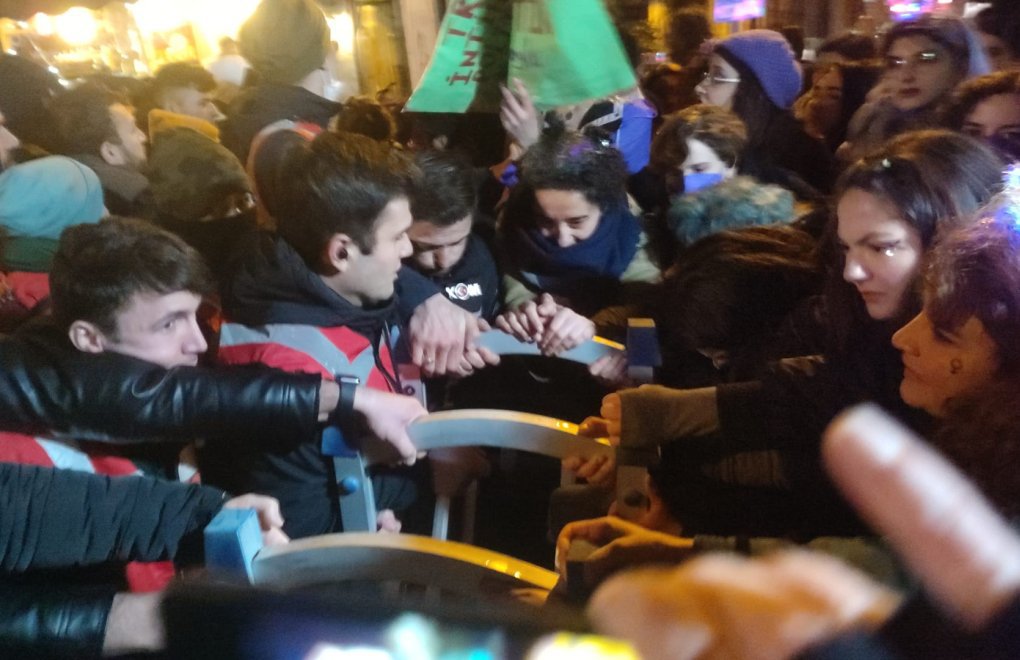* Photos: Yağmur Karagöz / bianet
Click to read the article in Turkish
In the South Asian country of Nepal, 1996 saw the Maoist rebellion against poverty and the king turning into a civil war. After 10 years of resistance, a peace treaty was signed in 2006; and two years later, world's last Hindu kingdom which have reigned for 239 years is abolished, giving way to the Federal Democratic Republic of Nepal in 2008.
The country's Prime Minister is Khadga Prasad Oli, leader of Nepal Communist Party (NCP). The president is Bidhya Devi Bandari, who once served as a member of the Communist Party of Nepal (Unified Marxist–Leninist) (CPN-UML) and is known for her work towards women's rights.
Boosting a current population of over 26 million people, Nepal also struggled with many natural disasters such as earthquakes, floods and landslides after the abolition of a feudal government which reigned over the country for two centuries. Today, the country is now facing a new challenge with the novel coronavirus (COVID-19) outbreak, which has spread to all countries around the world. As of May 3, 2020, there were 84 confirmed cases of COVID-19 and no deaths due to the disease in Nepal.
We have talked about Nepal's fight against the coronavirus with Pasang Sherpa, a member of the Nepal Communist Party (NCP), and journalist Rajendra Baniya, both living in Kathmandu.
Psang Sherpa said the Nepal government has taken effective measures to combat the coronavirus, provided people with food and masks, and imposed penalties to those who overcharge masks:
"During the lockdown, people are forbidden to go out except in emergency situations, and when they leave, they have to wear masks. There is a curfew in place, but people are allowed to go to the store between 4 and 8 a.m. in the morning with limited time to shop for their basic needs. During the lockdown; food markets, pharmacies, hospitals, and certain companies in the agricultural industry are still open.
"The quarantine period was extended until May 7. The government conducts awareness campaigns for citizens and sends information about the coronavirus to mobile phones. People coming from abroad are put in mandatory quarantine for 14 days. There are support packages prepared for people struggling to find food due to economic distress caused by the coronavirus. Along with food packages, masks and disinfectants are also distributed to those who need them."
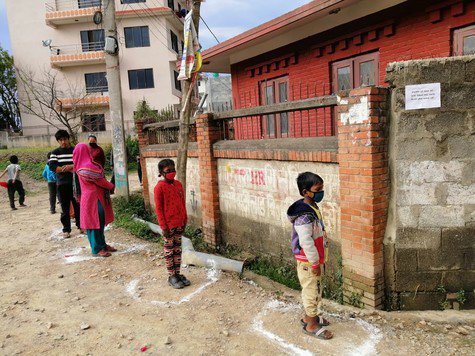
* Photo: Pasang Sherpa
On the other hand, Nepal Avenues TV journalist Rajendra Baniya paints a different picture, stating that when the virus first emerged in China, the government was not fully informed about the situation and started to take serious steps only after Italy became the new epicenter of the pandemic:
"The government established the first health check system at the international airport in Kathmandu. People arriving from different countries were put into government-controlled quarantine or were asked to isolate themselves at home. More than 160 students who were in China were brought back to Nepal and quarantined. After India declared a nationwide lockdown, Nepal government was kind of forced to do the same (the lockdown started on March 24 for 7 days initially, then gradually extended and still is in effect today). The silver lining here is that there are no more than 60 active cases, and 13 of those are already discharged from hospital to recover at home. Both international and local airports in the city are closed, and the public is following the rules of the curfew. Land borders are closed, and people are not allowed to travel between different cities in the country.
'Initial cases were from outside the country'
"More than 50,000 RDK's and 10,000 PCR tests have been conducted so far. It seems that most of the cases which came out as positive originated from India and other countries. For example, the first patient was a person who returned from China, and the second was a person who returned from France. There are no patients in critical condition and no intubated patients. There are also no fatalities.
"Today, the private sector can set up health checkpoints and tests can be conducted in private hospitals. However, it can be said that Nepal is behind the curve in testing. The most important point here is that the government did not prepare a large-scale support package for people who are struggling due to losing their income. So, in short, government's measures are satisfactory, but not sufficient."
'It is estimated that more than 1 million people may lose their jobs due to the epidemic'
"Some companies and even media organizations have already terminated contracts of their employees or forced them to take leave of absence. In some companies, employees were forced to take unpaid leave. And in some places, employees agreed to continue working from home on a half salary.
"According to the reports, it is estimated that more than one million people in the country may face unemployment. This will particularly affect tourism and other industries associated with tourism.
"In other sectors, there is also a decline in the number of working employees. The situation in the media is similar, and we have reports that some major media companies are letting people go.
"The public believes that official statistics for the coronavirus are correct. People are satisfied with the government's measures, but they think that the number of tests should be increased. As of May 3, 48,539 people were tested with RDK's and 1,098 of those were confirmed by PCR tests.
"People do not complain much although they are not particularly fond of the fact the lockdown period is extended. Right now, the main problem in Nepal is the economy. Today, not only the working class, but also the middle class face significant difficulties making ends meet."
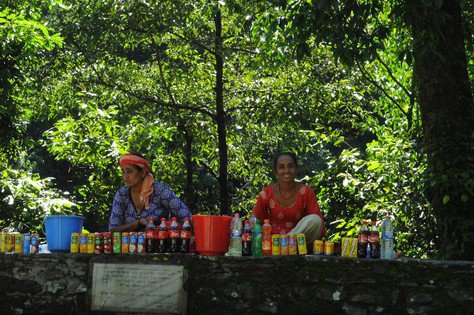
When I first went to Kathmandu in 2018, a cloud of dust was dominating the city. Then I learned that dust was a problem for many years, and masks were part of a daily life there. And now, masks became part of daily life all over the world. Rajendra explained that so many people leaving Kathmandu during the pandemic have at least made a positive change in environmental and air pollution in the city:
"Kathmandu really had some problems such as air pollution, overpopulation and unplanned urbanization. Since it is the federal capital, many people dream of settling in this city. Kathmandu also sits in the top spot on the list of cities with most pollution in South Asia. At the moment, the few people staying in Kathmandu are at home. Those who go out in the morning wear masks and follow the rules of social distancing.
"There are no N95 masks sold in the markets, and those who work around those places wear simple, disposable masks. Only health workers, some media employees and doctors use N95 masks. Not long ago, there was even a controversial incident where a famous businessperson was arrested for selling a thermal gun (infrared thermometer) worth 5,000 rupees for 15,000 rupees. Issues due to black marketing and exorbitant prices are increasing."
'2020 was to be the year of Nepal'
Nepal has been running a "Visit Nepal Year 2020" campaign for some time now. For the last year, people from all around the world have been invited to Nepal, and serious investments have been made for this campaign. However, due to the coronavirus outbreak, Hotel Association Nepal (HAN) announced that they estimate a 90 % drop in reservations for 2020 season.
"Almost all tourism employees and migrant laborers are out of work at the moment. Some of these people recently invested for the 'Visit Nepal Year 2020' and focused all their careers on it. At the moment, only a few of those tourism workers, who have no home in rural areas or those who could not leave the city before the lockdown, remain in Kathmandu. So, over 2 million people have left the Kathmandu Valley in the last few days.
"Tourism accounts for 7.5% of Nepal's GDP. Investors for the 'Visit Nepal Year 2020' have already made investments for 41,000 extra beds to hotels only, along with various investments in different sectors. Because of the pandemic, those investments are expected to plummet. For this reason, investors face the risk of being unable to pay their loan debts and demand soft loan or debt restructuring support from the government for easier payment options. Most of these investing companies have given their employees unpaid leave. The estimation is 3-4% of Gross Value Added (GVA) will be negatively affected by the tourism crisis alone.
"The 'Tourism Board' agency within the Ministry of Tourism is trying to assess expected losses in the industry. This is a three-member team within the ministry, and they had asked investors in the industry to document the amount of their investments for 'Visit Nepal Year 2020'. Their goal here is to announce a support plan by revealing estimated losses. But the problem is that most small-scale companies in the tourism sector are not registered within the ministry, and the number of unofficial employees is quite high. Therefore, they are not eligible for receiving any aid packages. Nevertheless, at the moment, the government is trying to provide short-term jobs to about 10,000 people. The jobs they are offering in this plan are usually cleaning jobs for Himalayan outskirts and rivers."
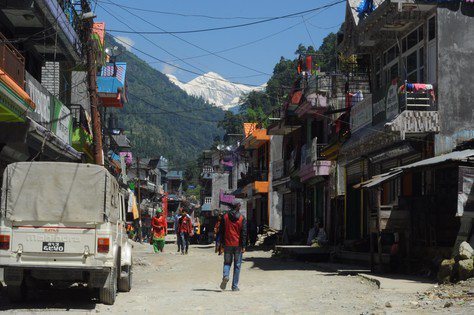
'Schools may be opened in July'
"Since schools are closed, several public schools had been turned into quarantine centers. In Nepal, the academic year ends in mid-April. Academic education in schools was already completed before the controlled curfew, except for the Secondary Education (SE) exam for the 10th graders. SE exam was postponed along with exams for 11th and 12th graders. The government plans to hold these exams three weeks after quarantine measures have been loosened. The Ministry of Education is preparing to hold the exams in the first week of June. On the other hand, some colleges switched to online lessons and online education, but this is not very effective since only around 33 percent of the public here can use the Internet. If the situation returns to normal, schools are expected to open after July."
Silence in Pashupatinath
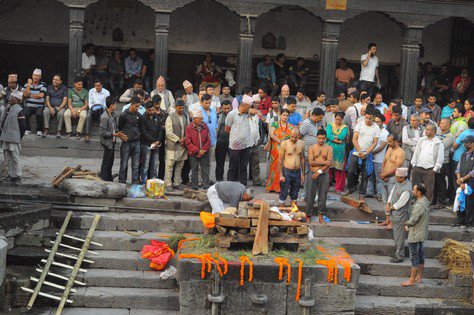
People who practice Hindu faith in Nepal often cremate their dead in Pashupatinath, the temple of God Shiva, located on the banks of the sacred river Bagmati. During the ceremony, flowers are placed on the body, people dance around the deceased, the body then is set on fire and is given to the sacred waters of Bagmati so that his or her ashes can reach the Ganges. Rajendra Baniya explained that these ceremonies were also interrupted due to coronavirus:
"There was a huge decrease in the number of cremations. Given that more than half of the people living in the Kathmandu valley left the city and the elderly citizens paying more attention to their health, this should be considered normal, though. Apart from this, cremations can be performed at electrically powered cremation stations, where religious funeral ceremonies can also be performed. Both the police and the Chief District Office (CDO) are able to give online permissions for such emergencies." (YK/SD)





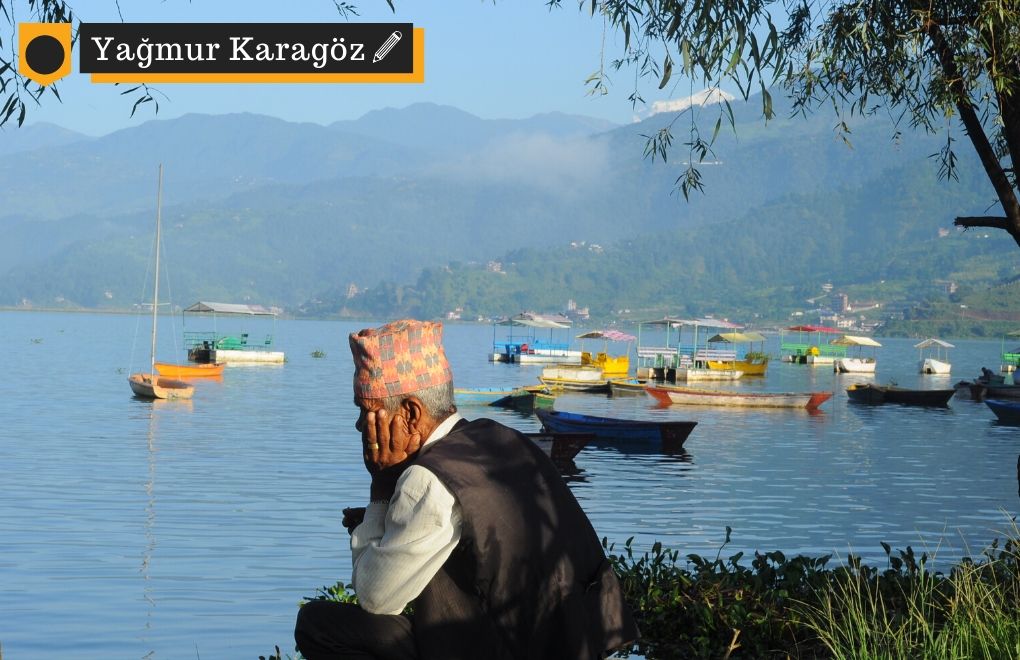
.jpg)
